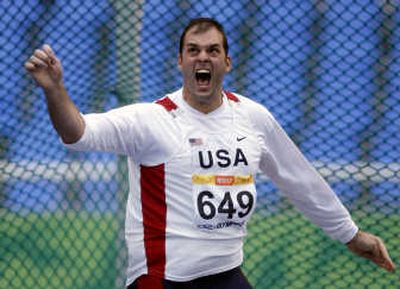U.S. rules Pan Am Games

RIO DE JANEIRO, Brazil – After grabbing medals at nearly every venue in the Pan American Games, U.S. athletes can look ahead – to what?
Certainly to the world championships in a variety of sports, and then to the Beijing Olympics in one year’s time. They can carry optimism into international events in gymnastics, swimming, shooting, equestrian, volleyball, softball and water polo.
Their work at the Pan Ams has been exemplary, sometimes overwhelming in those sports. But what does it all mean heading into the buildup year to Beijing? What will happen when such sporting powers as China, Japan, Russia, Australia, Germany and the Czech Republic are in the mix?
“I think PASO and the IOC are to be complimented on how much better the quality of this competition has become,” Steve Roush, USOC chief of sport performance, said Saturday.
Americans did their best work in Rio, not surprisingly, in sports where there is true depth: swimming, shooting, gymnastics. And in team sports where the United States has long been a powerhouse: softball, water polo and women’s basketball.
The Pan Ams medals fest certainly has featured some strong performances from rising athletes, including Shawn Johnson (four gold, one silver) in gymnastics; Julia Smit (four gold, one silver) and Kathleen Hersey (four gold) in swimming; Luis Yanez in boxing; and Eva Lee (three golds) in badminton. Look for those names in Beijing.
But also be aware that the medals haul was conducted, in many cases, by second- and third-stringers – and against second-rate competition. For example, no members of the U.S. teams for worlds in track and field or swimming contributed to the 200-plus medals won in Rio.
“We maximized as much as possible our Olympic qualification opportunities here, which is a great sign,” Roush said.
So, judging by what happened in Rio, in which sports will Americans be a major threat to win medals in Beijing?
Certainly softball, in which the U.S. women almost never lose and have enough pitchers to throw no-hitters nearly every time out. And in water polo, where the women are world champs and already qualified for 2008, as are the men.
Definitely in women’s gymnastics, with a stable of stars that Johnson now joins. And in shooting, always a U.S. stronghold; the shooters grabbed just about every qualifying spot for Beijing that was available. And in synchronized swimming, where the United States earned both 2008 Olympics berths that were on the line here.
The Pan Ams also displayed some of the holes in U.S. international athletics. It’s become perfectly evident that college men can’t compete in basketball anymore – the Americans lost to Uruguay and Panama at these games. The cast of competitors in women’s field events lags well behind Cuba, for instance. Boxing remains problematic because U.S. teams tend to be young and far too inexperienced on the global scene.
But Roush is certain the Pan Ams helped there, too.
“It is key for us to be a partner and help in developing these athletic programs in our hemisphere,” he said, “because it makes the competition all that much better, and makes us all that much better.”